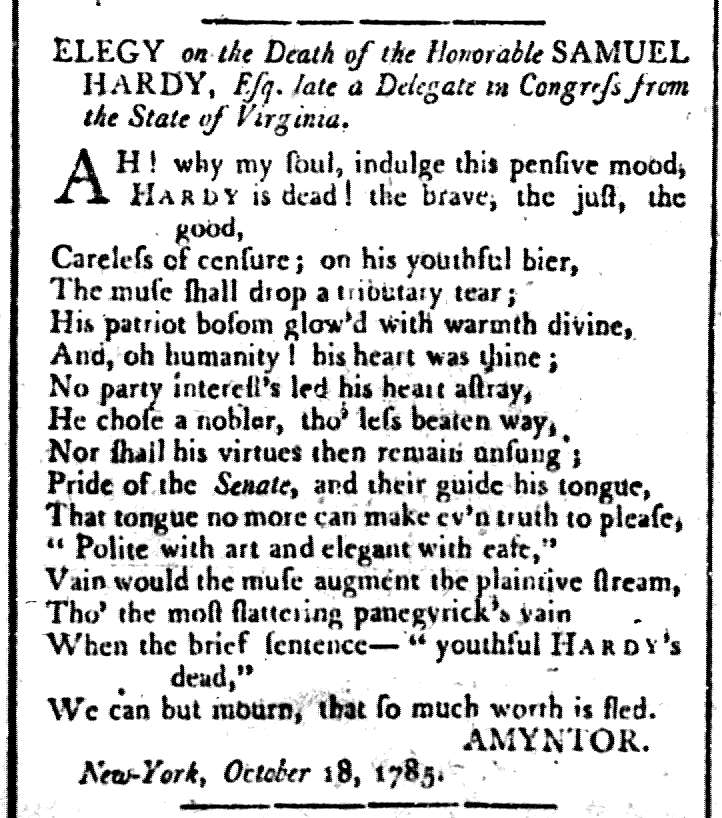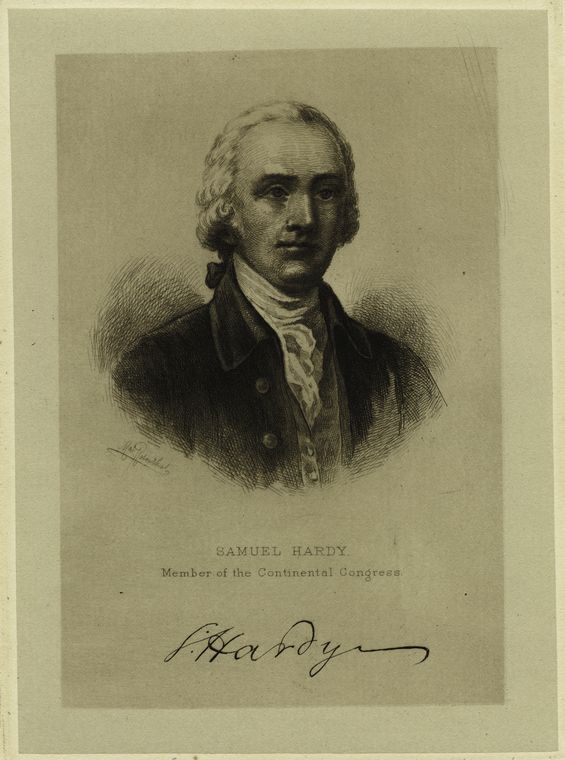Difference between revisions of "Samuel Hardy"
m |
(Infobox) |
||
| (3 intermediate revisions by the same user not shown) | |||
| Line 15: | Line 15: | ||
|3rdofficepreceded= | |3rdofficepreceded= | ||
|3rdofficesucceeded= | |3rdofficesucceeded= | ||
| − | |4thoffice=Member of the | + | |4thoffice=Member of the Congress of the Confederation |
|4thofficedates=1783-1785 | |4thofficedates=1783-1785 | ||
|4thofficepreceded= | |4thofficepreceded= | ||
| Line 34: | Line 34: | ||
|bornplace=Isle of Wight County, Virginia | |bornplace=Isle of Wight County, Virginia | ||
|dieddate=October 17, 1785 | |dieddate=October 17, 1785 | ||
| − | |diedplace= | + | |diedplace=New York City, New York |
| − | |restingplace= | + | |restingplace= |
|residence= | |residence= | ||
|education= The College of William & Mary | |education= The College of William & Mary | ||
| Line 44: | Line 44: | ||
|knownfor= | |knownfor= | ||
|signature= | |signature= | ||
| − | }}[[wikipedia:Samuel Hardy|Samuel Hardy]] was born sometime around the year 1758 in Isle of Wight County, Virginia, the son of Richard Hardy and a descendant of George Hardy, a representative of Virginia in the House of Burgesses from 1642-1652.<ref>[https://books.google.com/books?id=TGFIAAAAYAAJ&pg=PA80 ''Appletons' Cyclopaedia of American Biography,''] vol. 3, James Grant Wilson and John Fiske, eds. (New York: 1887), 80. | + | }}[[wikipedia:Samuel Hardy|Samuel Hardy]] was born sometime around the year 1758 in Isle of Wight County, Virginia, the son of Richard Hardy and a descendant of George Hardy, a representative of Virginia in the House of Burgesses from 1642-1652.<ref>[https://books.google.com/books?id=TGFIAAAAYAAJ&pg=PA80 ''Appletons' Cyclopaedia of American Biography,''] vol. 3, James Grant Wilson and John Fiske, eds. (New York: 1887), 80.</ref> |
| + | [[File:ElegyNewYorkJournal20October1785P4Detail.jpg|left|thumb|350px|"Elegy on the Death of the Honorable Samuel Hardy, Esq. Late a Delegate in Congress from the State of Virginia," by Amyntor. [[:File:NewYorkJournal20October201785P1P4.pdf|''New-York Journal, or The Weekly Register,'']] October 20, 1785, p. 4.]] | ||
After completing his preparatory studies, Hardy attended the College of William & Mary in Williamsburg, Virginia. While in Williamsburg, Hardy studied law under [[George Wythe]].<ref>[https://books.google.com/books?id=Z8lAs_QeKkkC&pg=PA1061 ''Biographical Directory of the American Congress. 1774-1927''], (Washington, D.C.: Government Printing Office, 1927), 1061; Mark T. Flahive, "[http://heinonline.org/HOL/Page?handle=hein.journals/abaj64&div=313&g_sent=1&collection=journals The Origins of the American Law School]," ''American Bar Association Journal'', Vol. 64 (1978), pp. 1868-1872, 1869, accessed August 31, 2015.</ref> During his time as a student, Hardy actually served as a member of the State House of Delegates in 1778, and from 1780 to 1782.<ref>Ibid.</ref> | After completing his preparatory studies, Hardy attended the College of William & Mary in Williamsburg, Virginia. While in Williamsburg, Hardy studied law under [[George Wythe]].<ref>[https://books.google.com/books?id=Z8lAs_QeKkkC&pg=PA1061 ''Biographical Directory of the American Congress. 1774-1927''], (Washington, D.C.: Government Printing Office, 1927), 1061; Mark T. Flahive, "[http://heinonline.org/HOL/Page?handle=hein.journals/abaj64&div=313&g_sent=1&collection=journals The Origins of the American Law School]," ''American Bar Association Journal'', Vol. 64 (1978), pp. 1868-1872, 1869, accessed August 31, 2015.</ref> During his time as a student, Hardy actually served as a member of the State House of Delegates in 1778, and from 1780 to 1782.<ref>Ibid.</ref> | ||
| − | After completing his studies and gaining admittance to the bar, Hardy commenced his legal practice and became a well-known lawyer. <ref>Flahive, "The Origins of the American Law School."</ref> While practicing law, Hardy also continued his service as a Delegate for the Commonwealth of Virginia, and served on the executive council. From May to October of 1782, he served as the Lieutenant Governor of Virginia. In 1783, around the age of 25, Hardy was elected to represent Virginia to the Confederation Congress in Philadelphia and later New York City. Hardy died at his home in New York on October 17, 1785.<ref>''New-York Journal, or The Weekly Register,'' October 20, 1785, 4.</ref> Along with tributes from Congress, an elegy attributed to Alexander Hamilton appeared in | + | After completing his studies and gaining admittance to the bar, Hardy commenced his legal practice and became a well-known lawyer. <ref>Flahive, "The Origins of the American Law School."</ref> While practicing law, Hardy also continued his service as a Delegate for the Commonwealth of Virginia, and served on the executive council. From May to October of 1782, he served as the Lieutenant Governor of Virginia. In 1783, around the age of 25, Hardy was elected to represent Virginia to the Confederation Congress in Philadelphia, and later New York City. Hardy died at his home in New York on October 17, 1785.<ref>[[:File:NewYorkJournal20October201785P1P4.pdf|''New-York Journal, or The Weekly Register,'']] October 20, 1785, 4.</ref> Along with tributes from Congress, an elegy attributed to Alexander Hamilton appeared in [[:File:NewYorkJournal20October201785P1P4.pdf|local papers]].<ref>R. A. Brock, ed., ''Proceedings of the Virginia Historical Society At The Annual Meeting Held December 21-22, 1891, With Historical Papers Read on the Occasion, and Others'' (Richmond, VA: The Virginia Historical Society, 1892), 151-153.</ref> |
Shortly after Hardy's death, the Virginia General Assembly named a county in his honor, located in what is now West Virginia. | Shortly after Hardy's death, the Virginia General Assembly named a county in his honor, located in what is now West Virginia. | ||
==See also== | ==See also== | ||
| + | <div style="overflow: hidden;"> | ||
*[[Wythe the Teacher]] | *[[Wythe the Teacher]] | ||
| + | </div> | ||
==References== | ==References== | ||
| + | <div style="overflow: hidden;"> | ||
<references /> | <references /> | ||
| + | </div> | ||
[[Category: Wythe's Students]] | [[Category: Wythe's Students]] | ||
Latest revision as of 12:05, 3 December 2021
| Samuel Hardy | |
| Member of the State House of Delegates (VA) | |
| In office | |
| 1778, 1780-1782 | |
| Member of the Executive Council | |
| In office | |
| June 1781 | |
| Lieutenant Governor of Virginia | |
| In office | |
| May 29, 1782-October 11, 1782 | |
| Member of the Congress of the Confederation | |
| In office | |
| 1783-1785 | |
| Personal details | |
| Born | ca. 1758 |
| Isle of Wight County, Virginia | |
| Died | October 17, 1785 |
| New York City, New York | |
| Education | The College of William & Mary |
| Profession | Lawyer, politician (congressman) |
Samuel Hardy was born sometime around the year 1758 in Isle of Wight County, Virginia, the son of Richard Hardy and a descendant of George Hardy, a representative of Virginia in the House of Burgesses from 1642-1652.[1]

After completing his preparatory studies, Hardy attended the College of William & Mary in Williamsburg, Virginia. While in Williamsburg, Hardy studied law under George Wythe.[2] During his time as a student, Hardy actually served as a member of the State House of Delegates in 1778, and from 1780 to 1782.[3]
After completing his studies and gaining admittance to the bar, Hardy commenced his legal practice and became a well-known lawyer. [4] While practicing law, Hardy also continued his service as a Delegate for the Commonwealth of Virginia, and served on the executive council. From May to October of 1782, he served as the Lieutenant Governor of Virginia. In 1783, around the age of 25, Hardy was elected to represent Virginia to the Confederation Congress in Philadelphia, and later New York City. Hardy died at his home in New York on October 17, 1785.[5] Along with tributes from Congress, an elegy attributed to Alexander Hamilton appeared in local papers.[6]
Shortly after Hardy's death, the Virginia General Assembly named a county in his honor, located in what is now West Virginia.
